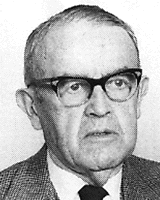Max Petitpierre
( lawyer, politician) | ||||||||||
|---|---|---|---|---|---|---|---|---|---|---|
 | ||||||||||
| Born | 26 February 1899 | |||||||||
| Died | 25 March 1994 (Age 95) | |||||||||
| Nationality | Swiss | |||||||||
| Alma mater | • University of Neuchâtel • University of Zurich • University of Munich | |||||||||
| Children | Gilles Petitpierre | |||||||||
| Spouse | Antoinette de Rougemont | |||||||||
| Party | Free Democratic Party of Switzerland | |||||||||
| Relatives | ||||||||||
Swiss Foreign Minister who "modified" neutrality to a "pro-Western neutrality".
| ||||||||||
Max Petitpierre was a Swiss lawyer and politician. As Head of the Swiss Department of Foreign Affairs, he "modified" the traditional Swiss neutrality to a "pro-Western neutrality".[1]\[2]
Contents
Education
Petitpierre studied law at the University of Neuchâtel, as well as in Zurich and Munich. He obtained his bachelor's degree in 1921 and his doctorate in 1924. During his studies, he became a member of the Zofingia student association.[3]
Family
In 1928, he married Antoinette de Rougemont (1903-2002), the sister of the writer (and later fellow Bilderberger) Denis de Rougemont, with whom he had three boys and a girl. His son Gilles, a professor of private law at the University of Geneva. His daughter Eliane was the wife of the writer Nicolas Bouvier.
Career
He became a lawyer in 1922 and then a notary in 1925. In 1932, he was appointed extraordinary professor of private law and civil procedure at the University of Neuchâtel, then dean of the faculty of law in 1939.
A member of the Radical-Democratic Party, he was elected in 1937 to the Grand Council of the canton of Neuchâtel and in 1940 to the General Council, the legislative council of the city of Neuchâtel. In 1942, he was elected to the Council of States, he thus represented his canton for three years in the upper house of the Swiss parliament. There he was a member of the full powers commission, a "supervisory" body of the Federal Council during the Second World War.
Department of Foreign Affairs
Parliament elected Max Petitpierre as the successor of Marcel Pilet-Golaz to the Federal Council (government) on 14 December 1944. He took over the Political Department from his predecessor and party colleague on 1 February 1945. The parliament confirmed him in office in 1947, 1951, 1955 and 1959. He was Vice-President of the Bundesrat in 1949 and Federal President in 1950. As a result of the resignations of Vice-Presidents Josef Escher and Giuseppe Lepori, he became directly Federal president in 1955 and 1960. After Philipp Etter left the Federal Council, he was the longest-serving member of the government from 1960 to 1961. For health reasons, he resigned on June 30, 1961.[4]
After the war, the victorious powers distrusted Switzerland, which had maintained economic relations with the German Reich until its collapse. Max Petitpierre tried to break through this foreign policy and economic isolation. After tough negotiations, the Washington Agreement was concluded with the Allies in 1946. where Allied representatives be admitted to Switzerland to track down concealed German assets and Switzerland to pay 250 million francs as indemnities; this was seen as an easy solution for Switzerland.[5][6] He resumed diplomatic relations with the Soviet Union.
On January 17, 1950, Petitpierre achieved the recognition of the People's Republic of China by Switzerland surprisingly quickly. Switzerland was thus the fifth Western country with diplomatic relations with Red China after Great Britain, Denmark, Norway and Sweden.
Neutrality
Petitpierre realigned Swiss foreign policy from a strict neutrality to an alignment with with "the West" (US/UK), a policy that remained until the end of the Cold War and into the 2020s. With the help of neutrality, Switzerland's independence should continue to be guaranteed. Joining political organizations and military alliances, in contrast to economic cooperation, was excluded. At the same time, Switzerland would join humanitarian initiatives. For this reason, Switzerland joined the UN's specialized agencies (FAO, IMF, [ILO]] etc[7]), provided humanitarian aid and made its first attempts at development aid.[8]
In 1963 Petitpierre wrote: "neutrality makes sense for a country like Switzerland not to get involved in any war activities nor to participate voluntarily in any armed conflicts. Only in the case of an attack against Swiss independence by military forces would the Swiss army defend its territory"." A British memorandum from 1956 showed that the deep political reality was otherwise, where a secret deal was agreed for Switzerland to join NATO if there was a war with the Soviet Union.[9]
Events Participated in
| Event | Start | End | Location(s) | Description |
|---|---|---|---|---|
| Bilderberg/1962 | 18 May 1962 | 20 May 1962 | Sweden Saltsjöbaden | The 11th Bilderberg meeting and the first one in Sweden. |
| Bilderberg/1963 | 29 March 1963 | 31 March 1963 | France Cannes Hotel Martinez | The 12th Bilderberg meeting and the second one in France. |
References
- ↑ https://www.jstor.org/stable/24703271
- ↑ https://time.com/archive/6611144/switzerland-neutrality-is-not-indifference/
- ↑ https://www.munzinger.de/search/go/document.jsp?id=00000001974
- ↑ https://www.admin.ch/gov/en/start/federal-council/members-of-the-federal-council/max-petitpierre.html
- ↑ https://de.wikipedia.org/wiki/Abkommen_%C3%BCber_deutsche_Verm%C3%B6genswerte_in_der_Schweiz
- ↑ https://www.cia.gov/resources/csi/static/oss-project-safehaven.pdf
- ↑ https://ask.un.org/faq/140935
- ↑ https://www.nytimes.com/1994/04/11/obituaries/max-petitpierre-95-swiss-aide-who-modified-neutrality-dies.html
- ↑ https://www.statewatch.org/statewatch-database/montgomery-memorandum-cast-shadow-over-swiss-neutrality/